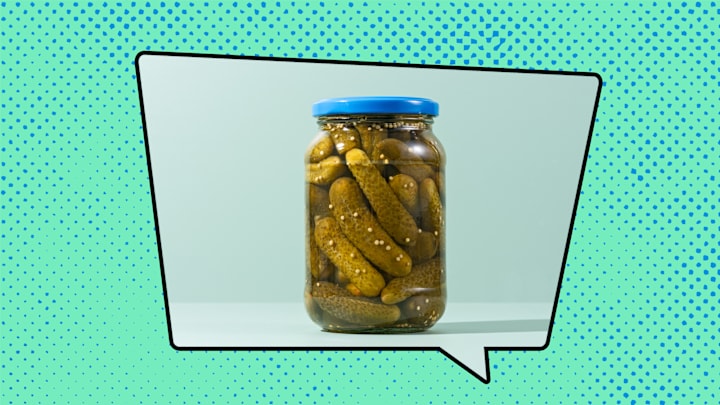There’s something adorable about the expression in a pickle. Whatever trouble or predicament you’re in, once it’s described in that way, it sounds kind of cute. You can even apply it to all kinds of scenarios (i.e. “The Mafia has discovered I’ve been stealing from them, so now I’m in a bit of a pickle!”).
At a little over 4 feet long, even the largest pickle jar in the world isn’t big enough for most to actually enter. So where exactly does this idiom come from? It shows up in William Shakespeare’s The Tempest (written around 1610), spoken by Alonso: “And Trinculo is reeling ripe: Where should they find this grand liquor that hath gilded ’em? How camest thou in this pickle?”
Generally speaking, if somebody’s camest in your pickle, it’s time to get new roommates. But in this context, Alonso is referring to Trinculo being drunk—according to Grammarist, pickled in early 17th century England was a colloquialism for “being heavily intoxicated.” Alonso’s also asking how Trinculo managed to get so drunk, given that they’re both on an island with no booze.
While the idiom appears in The Tempest, it wasn’t the first instance where the word pickle was used in print. It appears in John Heywood’s 1562 collection Proverbs and Epigrams (“Freilties pickell”), although the meaning is somewhat ambiguous and doesn’t seem to suggest drunkenness. The term pickle itself is thought to come from the Dutch pekel, referring to brine rather than its contents, hence pickling. The leap from “preserved due to being submerged in liquid” to “drunk” isn’t a huge one, especially given alcohol’s preservative qualities.
In the Brine vs. In a Bind
But how did being in one come to mean a tricky situation? Fifty years after Shakespeare, diarist Samuel Pepys appeared to be using it that way, writing in 1660 of being “at home with the workmen all the afternoon, our house being in the most sad pickle.” So at some point in that intervening half-century, it acquired that second meaning.
Some point to the Dutch phrase in de pekel zijn (meaning “to sit in the pickle brine”) as the ultimate root of the idiom. However, certain Dutch etymological dictionaries maintain that the expression may have been more literal (directly pertaining to brine) or along the lines of Shakespeare’s usage.
According to a theory by food writer Sam Dean, the expression makes a lot more sense when you remember that the word pickle means something completely different in the UK than it does in America, where it generally refers to the dill variety—a cucumber rendered more delicious by the cunning application of brine, herbs, and the passage of many months. However, in Britain, that’s known as a gherkin, and the term pickle usually indicates a condiment made from a mishmash of vegetables, spices, and vinegar, a deliciously tangy-sweet brown slop that turns a cheese sandwich from a mundane experience into a culinary adventure.
This pickle, while glorious, is also all over the place. It’s sticky, slimy, and isn’t entirely texturally dissimilar to the penultimate vomit that comes from a bout of food poisoning. What a jumbled mess. Therefore, what a pickle indeed.
Have you got a Big Question you’d like us to answer? If so, let us know by emailing us at bigquestions@mentalfloss.com.
Discover More Fascinating Phrase Origins Here:
